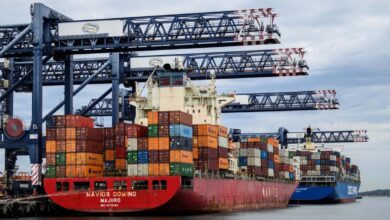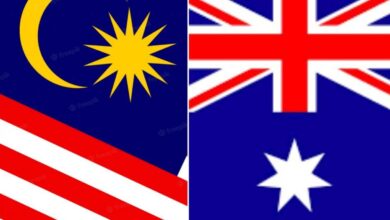Central bank should lift rates and Labor ought to cut spending to help with inflation, IMF says

“The pace of disinflation remains slow, with strong pressures from services,” the IMF noted. “Further rate hikes will likely be needed in the absence of supportive alternative policies.”
Following its trip to Australia to meet key economic officials, the Washington-based fund forecast the RBA cash rate to average 4.4 per cent this year and 4 per cent in 2025 – implying limited relief from the current 4.35 per cent cash rate.
Rein in government spending
In pointed advice to the federal and state governments to cut spending or raise taxes to help the RBA cool inflation faster, the IMF said their combined budgets were on track for a slight “loosening” in 2023-24 and 2024-25 when inflation was still high and the economy running beyond capacity.
“Fiscal policy should support the RBA’s efforts through a tighter overall stance. In the near term, new measures add spending – albeit limited – relative to the last budget,” the fund said of federal Treasurer Jim Chalmers’ budget, while noting he had saved most of the revenue windfalls from high commodity prices and bracket creep.
Dr Chalmers is on track to deliver a second budget surplus.
Nevertheless, net new spending by the Albanese government on areas such as aged care and the NDIS injected about 0.6 per cent of GDP ($12 billion) extra into the economy in 2023-24 and 0.4 per cent ($8 billion) in 2024-25, the fund’s analysis showed.
“Expenditure as a share of GDP is projected to increase with the introduction of cost-of-living relief and other programs targeted to vulnerable households and businesses.
“The new measures are partly financed by modest savings from prioritisation of existing programs.”
It called on the Albanese government to co-ordinate spending restraint on social services and infrastructure with the states, while supporting “well targeted” and time-limited cost-of-living measures to support vulnerable households.
Prime Minister Anthony Albanese signalled this week that a new round of cost-of-living measures – such as electricity bill rebates – could be fast-tracked in coming weeks ahead of the May 14 budget. The Dunkley by-election in Melbourne is due on March 2.
The IMF warned of risks from a premature loosening of monetary policy and government spending before inflation was curbed, noting that highly indebted households would be crunched.
“Higher-for-longer interest rates would trigger pockets of household distress in Australia, given most housing loans are variable rate mortgages,” it said.
Echoing warnings from former RBA governor Philip Lowe, the fund said the pick-up in nominal wage growth to 4 per cent could delay inflation returning to the 2-3 per cent target band, particularly because of weak productivity growth.
“Despite historically low labour productivity, wages continue to trend upward, alongside real measures of unit labor costs,” the IMF noted.
“Sticky inflation could risk accelerating wage growth, potentially igniting a wage-price spiral with high and destabilising inflation expectations.”
The fund once again put tax reform at the centre of a productivity-boosting reform agenda and to fund age-related government spending.
Reforms vital for growth and equity
Shifting from a high dependence on personal income tax paid by working-age people to raising more revenue from less economically damaging indirect taxes such as the GST would be good for economic growth and promote generational equity, the fund said.
“Average income tax rates are high in Australia, and bracket creep will raise tax burden shouldered by workers to finance age-related spending,” the IMF said.
“The regressive impacts should be mitigated by targeted cash transfers and cost-of-living reliefs to vulnerable households. Addressing these challenges heads-on will avoid costly delays in tax reforms needed for sustained and shared prosperity.”
The fund backed the government’s targeting of superannuation tax breaks for account balances over $3 million and said Dr Chalmers should go further to increase “fairness and sustainability” of the tax system.
“The policy is in the right direction, although its scope is limited relative to the size of the forgone revenues,” the IMF said.
“The government should implement additional measures to minimise the tax breaks for the high-income earners, including through limiting concessions to capital gains tax.”
Dr Chalmers has ruled out changes to the 10 per cent GST and spoken of doing “modest but meaningful” tax changes in “bite-sized chunks”.
Measures announced to date include for high superannuation balances, a planned slight tightening of the petroleum resource rent tax on oil and gas producers, tougher multinational tax rules and measures related to franking credits for capital raisings and share buybacks.
In recent months, Mr Albanese and Dr Chalmers have more firmly backed in the $20 billion-a-year stage three personal income tax cuts favouring high-income earners and due to flow from July, noting they will help address bracket creep.
The IMF renewed calls for states and territories to replace stamp duties on property purchases with recurring land taxes, with revenue from a higher GST potentially helping bridge the proposed reform.
“At the state and territory level, implementing recurring property taxes in lieu of stamp duties on housing transactions would promote housing affordability, more efficient use of the housing stock, labour mobility, and more stable tax bases over the medium term,” it said.
“Transitional revenue losses, if substantial, could be bridged with higher GST.”
In a statement responding to the IMF, Dr Chalmers said the report was a “welcome endorsement of our progress in repairing the budget, fighting inflation and investing in skills, housing and energy.”
“While inflation is still a defining challenge, we are making encouraging progress; over 700,000 jobs have been created on the government’s watch, wages are growing at their fastest pace in nearly 15 years, and the budget is in much better nick because of our efforts.”
Shadow treasurer Angus Taylor said: “Most damning, the IMF has called out Labor’s weak budget management and migration policies as making inflation worse.”





